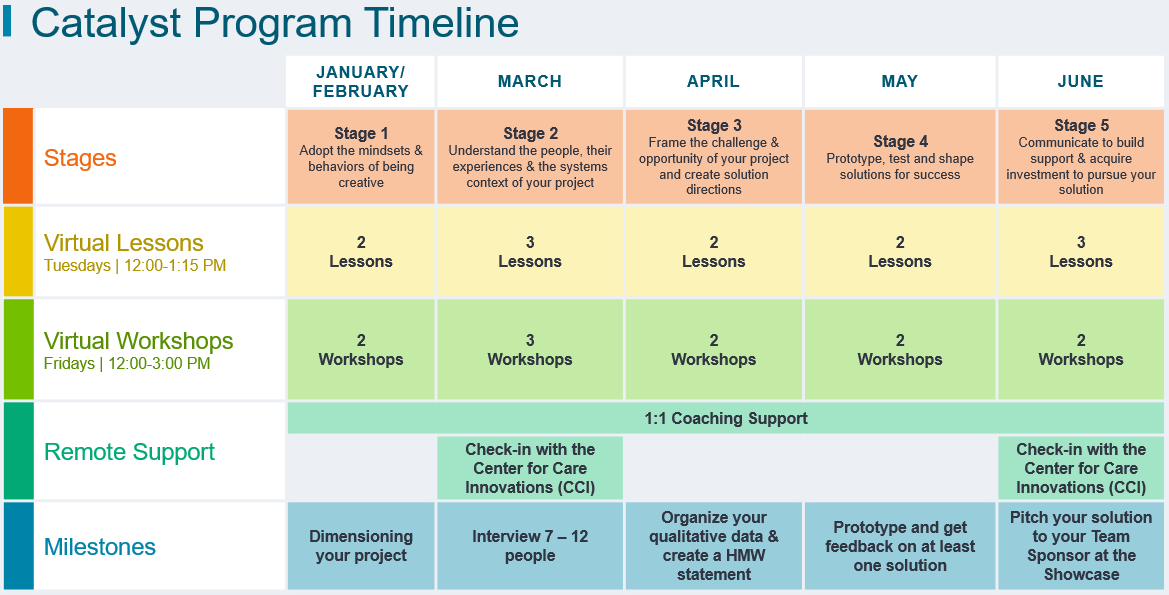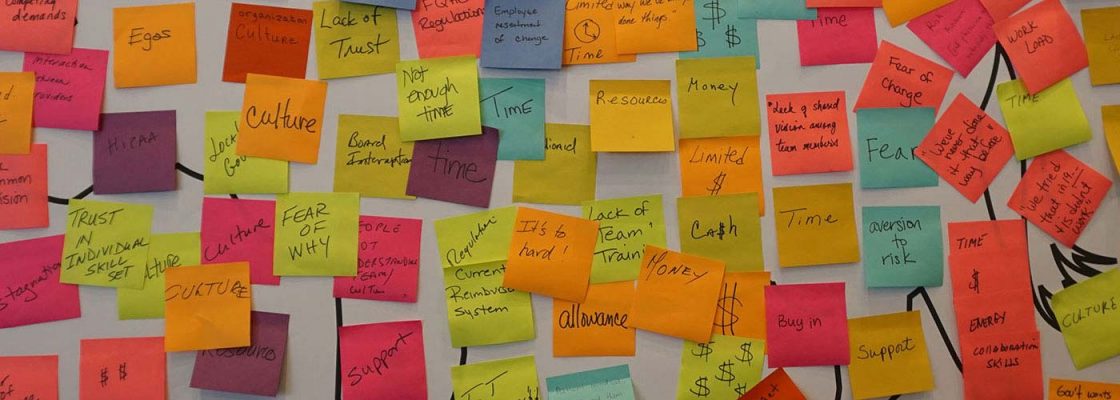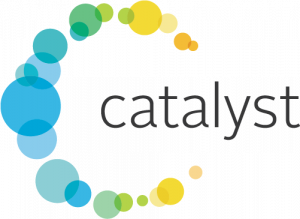2022 Application Overview
In partnership with Blue Shield of California Foundation (BSCF), the Center for Care Innovations (CCI) is growing a community of innovators who lead strategic efforts to transform the systems that support historically underinvested communities. We are launching our 11th cycle of Catalyst, our award-winning “design thinking” program that has already directly trained 338 people across 92 organizations. Design thinking is an approach to problem-solving that is rooted in understanding people’s needs and experiences, and it requires that innovators get comfortable in deepening their understanding of the problem before jumping into solutions. In our Catalyst program, we focus on advancing equity through the exploration of power dynamics, leading with humility, and community “co-design” where those most affected by the problem – whether they are clients, caregivers, staff, or community members – play a pivotal role in creating the solution.

As a Catalyst, you will become a change agent in your organization — discovering and testing new ways to address challenges, partnering with colleagues across your organization, and collaborating with diverse stakeholders in your community. You will develop expansive mindsets; combine creative, analytic, and design research methods; and push projects beyond conventional thinking to transformative possibilities. Check out these stories from Catalyst graduates:
- A multisector partnership uses design thinking to provide food as medicine.
- An after-school program helped its youth leaders more effectively use trauma-informed care practices to support younger peers.
- An organization that provides crisis-intervention services creates a position that cares for and supports their caregivers.
This year’s Catalyst program will be virtual and will apply design thinking to support the recovery and renewal of our communities. The COVID-19 pandemic is a global emergency that continues to impact all social determinants of health (economic stability, education, social and community cohesion, health and health care, neighborhood and built environment). It will require deep understanding and awareness, creative thinking, and co-design to transform the way we retain and sustain community health and well-being.
What We Provide
Catalyst is a curriculum-based program that provides teams with the training, tools, and protected time necessary to cultivate an innovative culture and an approach to problem-solving that is human-centered, collaborative, and creative. In addition to in-depth, virtual training, we provide ongoing coaching and support to reinforce your skill development. We also host an online resource library and a peer learning community to support continued learning. Project milestones help pace activities and sustain team momentum.
Our program offerings include:
- Virtual Training: Catalysts participate in in-depth training that includes bi-weekly virtual lessons and applied workshops over a six-month period. At the end of the program, teams present their solution ideas to their own organizational leadership and fellow Catalyst participants.
- Ongoing Coaching: We match Catalysts with peer coaches who have experience using design thinking in similar workplace settings. We embed coaches in the applied workshops and coaches work with the Catalyst teams between trainings.
- Peer-Learning Community: Teams regularly bring their questions and ideas to each other to get feedback and learn from others’ experiences. We also facilitate online discussions about innovation and design among current participants and Catalyst alumni.
- Virtual Resources: Teams will have access to Miro, an online collaborative platform that enables dispersed team members to work effectively together. We maintain an online library of design thinking how-to videos, guides, and case studies that you can access at any time.
- Grant: Eligible organizations receive a grant to offset team members’ time, project expenses, and compensation for people sharing their lived experiences throughout your project. Organizations will receive a $6,000 grant.
Along the way, you will learn how to build a stronger team, dismantle disempowering hierarchy, cultivate a more experimental culture, and connect with your key stakeholders in fulfilling and fun ways.
Eligibility
Within this year’s Catalyst program, we are supporting organizations (or partnerships) focused on the recovery and renewal of our communities. We invite organizations in California that focus on this goal and meet one of the following two categories to apply:
- 501(c)3 nonprofit organizations providing social services to improve the physical, mental, social, environmental, or economic well-being of historically underinvested communities.
- Safety net healthcare organizations that provide primary care services may also apply in partnership with up to two 501(c)3 nonprofit organizations, and the team must include representatives from the applying organizations.
-
- Organizations that have never participated in Catalyst will have priority.
- Innovation work is a team sport, so we ask each applicant team to apply with three members. Organizations that wish to send more than three members must pay $750 per additional participant to cover their program expenses.
- Applicant teams may comprise individuals from multiple organizations.
Currently, we are unable to accept applications from public schools, advocacy groups, or academic research organizations. We may have space for teams that do not meet these criteria to participate on a fee basis. Please email us if you are interested in learning more.
Timeline
The Catalyst program runs from January 25, 2022, to June 24, 2022.
Key dates:
- Informational Webinar: October 20, 2021, 12:00-1:00 PM. Register here.
- Application Deadline: November 19, 2021, 5:00 PM.
- Cohort Announced: December 20, 2021.
- Team Sponsor Orientation: January 25, 2022, 1:00-2:00 PM.
- Program Kickoff and Miro Orientation: February 1, 2022, 12:00-2:00 PM.
- Virtual Training: February 2022- June 2022.
- Final Presentation: June 24, 2022, 12:00-3:00 PM.
Program Expectations
Catalyst teams are made up of three team members and one team sponsor.
All three team members are expected to:
- Commit an average of 8-10 hours per month to Catalyst activities between February 2022 – June 2022.
- Participate in a Program Kick-Off & Miro Orientation on February 1, 2022, 12:00-2:00 PM.
- Participate in all lessons by watching live or on-demand.
- Participate in all virtual workshops in real-time.
- Complete assignments/milestones outside of programmatic events.
- Meet with your coach for at least 1 hour outside of programmatic events.
- Document research activities through photos and videos.
- Brainstorm, prototype, and test ideas with project stakeholders from outside of the core Catalyst team.
- Provide monthly updates about the project process to key stakeholders and your team sponsor.
- Present your ideas to your team sponsor at the Final Presentation on June 24, 2022. Each team member must attend.
Team sponsors are expected to:
- Allocate and protect 8-10 hours of team members’ work monthly during the six-month program to participate in virtual trainings, conduct research, and meet program milestones.
- Support their Catalysts in trying out their new skills on their applied project.
- Attend the Team Sponsor Orientation on January 25, 2022, from 12:00-2:00 PM.
- Attend the Final Presentation on June 24, 2022, from 12:00 -3:00 PM.
Program Structure and Content
Here’s a map of program milestones and the timeline of your team’s activities. It also outlines the key design thinking mindsets that you will build throughout the program. The pacing of the program gives your team time to apply what you are learning to an organizational project, work through challenges, and reflect on what you’re learning.

Strong Applications
Strong applications to the program will propose (1) a strong and highly engaged team, (2) committed leadership and resources, and (3) a compelling project topic.
Strong Team
We are looking for teams comprising leaders at various staff levels who are passionate “doers.” We strongly encourage you to build a team that represents diverse perspectives and experiences and that can effectively collaborate with one another. You’ll want to be mindful of power dynamics and foster a safe environment where your team members will be able to challenge one another’s ideas and make joint decisions over the course of the program.
Team members should be positioned to drive change within their organizations and/or provide first-hand perspectives into the challenge at hand. Strong teams include a member(s) whose role and responsibilities are critical for the success of the project, i.e. the person ultimately responsible for implementing the innovations. For example, if the project is likely to change a resource coordinator’s workflow, include an actual coordinator — not just the manager — on the team. Even better, a team could include a community member served by your organization.
Ideal candidates will possess these qualities:
- Desire to not only develop your own design thinking skills but also to share with and influence others to use these skills.
- Experience cultivating relationships and community will-building.
- Curious, resourceful, and unafraid to question the status quo.
- Willing to explore power dynamics and structures.
- Collaborative and action-oriented.
- Open to communicating visually through video, photos, drawings, etc.
Remember if you’re a safety net healthcare organization that provides primary care services you must also apply in partnership with one or more nonprofit organizations, and the team must include representatives from all participating organizations.
Committed Leadership and Resources
You must have direct support from your manager to apply what you learn in this program within your organization. The team sponsor should be fully on board and excited by the prospect of trying a new approach. The sponsor must also confirm that the team has protected work time over five months to dedicate to the project and program activities. Lastly, your team sponsor must attend the Team Sponsor Orientation and Final Presentation.
Compelling Project Topic
What exactly is a “project topic”? It may be an emerging issue your organization is facing in your community or a recurring pain point in the client experience that has yet to be resolved. Your team will be tasked with revisiting and further refining your project topic during the first phase of the program.
A compelling project topic meets the following criteria:
- Goal: Your project topic addresses and/or supports the recovery and renewal of your community.
- Unsolved: Your organization has not decided to pursue a specific solution to address the challenge. You are open to an array of possible solutions.
- Aligned with the community’s priorities: Your project topic will address the health and well-being of community members and will be informed by them during the program.
- Aligned with the organization’s priorities: Your project topic is connected to an existing organizational priority and there is an established interest in investing time and resources.
- Small to medium in scope: Given the short timeframe, we do not want you to work on challenges that are too broad. Instead, we encourage teams to consider tackling an element of a larger project. A challenge like reducing food insecurity is too broad and vague; finding fun ways for students to snack healthier after school is a better fit.
- Not on a tight deadline: The design thinking process requires that you spend time deeply understanding the problem before developing a solution. Do not pick a problem that you will need to solve before June 2022. Pick a project topic in which you can spend a few months observing and talking to community members, reflecting, and synthesizing what you are learning to refine and reframe your focus.
In past Catalyst cycles, some project challenges that have addressed recovery and renewal have included:
How might we…
…support our staff in implementing trauma-informed practices while addressing their own trauma?
…design new processes of food redistribution to support food-insecure households in our community?
…increase substance use recovery access within our community?
Please do not propose a solution, approach, or plan that you hope to implement during this program. We want Catalysts and their sponsors to come in with open minds so that your team can really think expansively about the project.
Learn More
Join us for an Informational Webinar on Wednesday, October 20, 2021, 12:00-1:00 PM to hear a detailed description of the program and ask questions. Register here.
Contact Us
For any other questions, please contact:
Ally Ottesen
Program Coordinator
[email protected]


